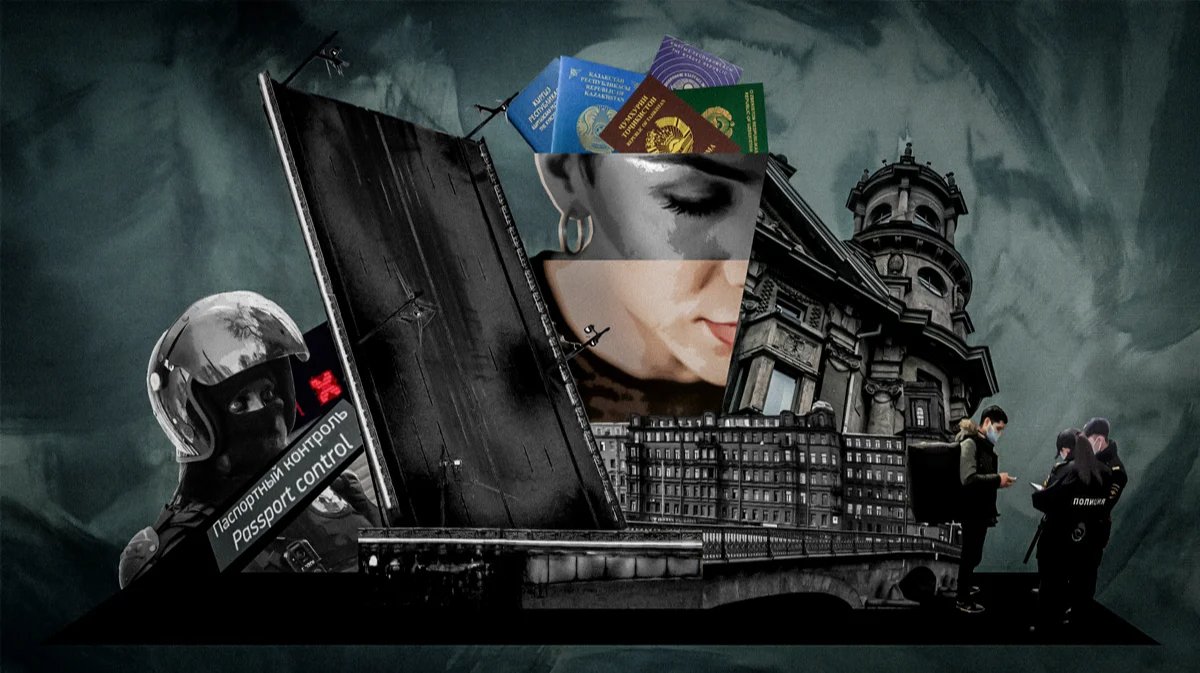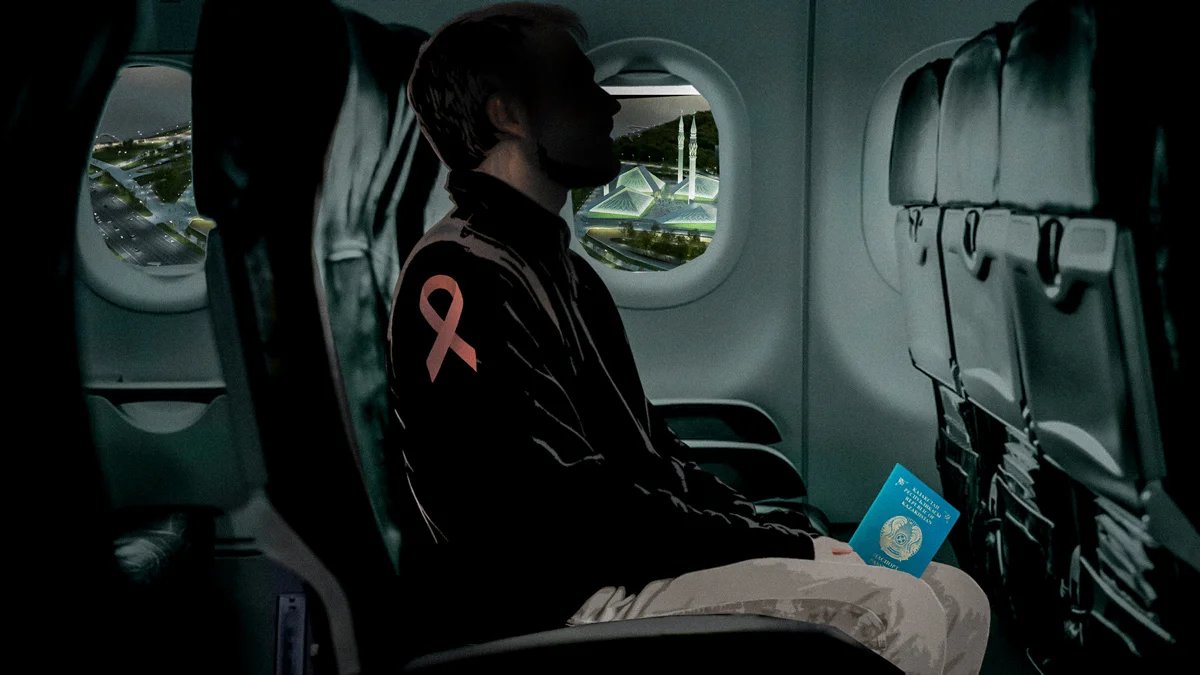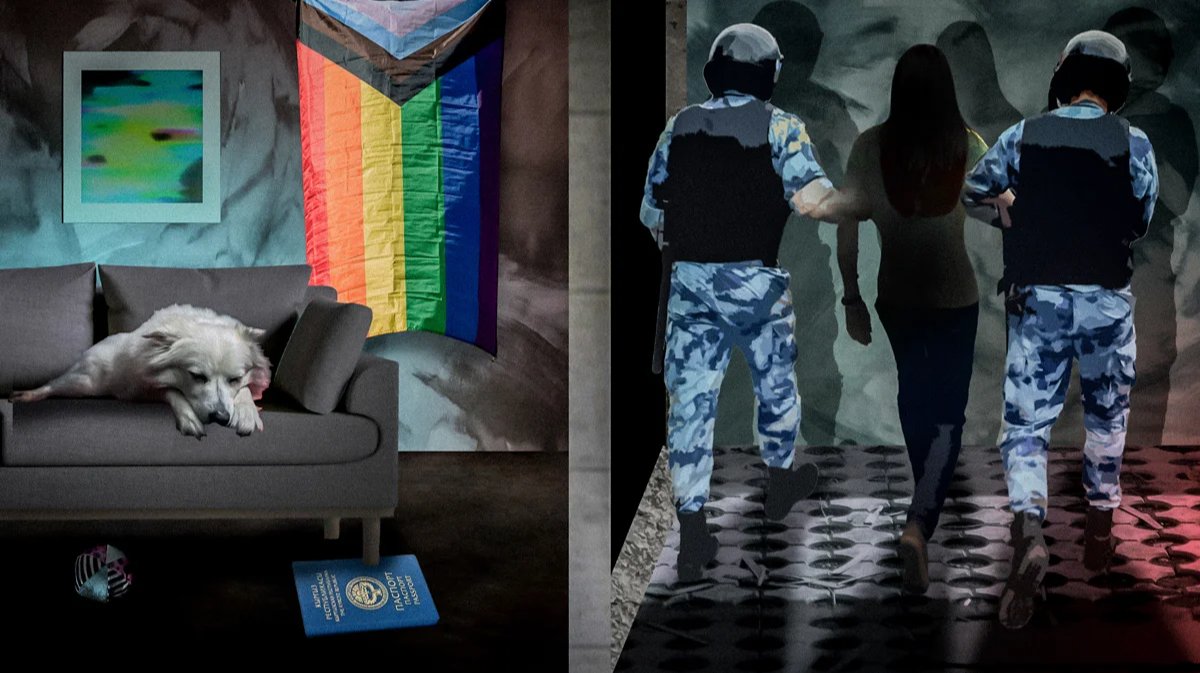Though discrimination against migrants in Russia is enshrined in law, queer migrants have things twice as hard — especially since the Supreme Court ruled that the “international LGBT movement” constituted an “extremist organisation”. Unlike Russian citizens, immigrants risk not only administrative and criminal prosecution but also deportation from the country.
Despite the significant deterioration of conditions for queer people in Russia in recent years, for many queer migrants living in Russia, deportation is the most frightening prospect, as it not only means being separated from loved ones and losing the life they have built in Russia, but in many cases, returning to an even less tolerant society.
‘Go back to being a man’
Aliya moved to Russia immediately after graduating from college in her native Kyrgyzstan. In St. Petersburg, Aliya underwent gender reassignment surgery and began hormone therapy. While in Russia, her passport expired, and she was told that it was not possible to change the gender marker in her Russian documents until she had done the same for her passport in Kyrgyzstan.
“The Kyrgyz Embassy wouldn’t give me a new passport. I collected all the documents, filled out the forms, and took them to the embassy. They sent them to Bishkek, and from there they replied that I could only get a passport by returning to the country,” Aliya recalls.
During her final year in the southern Russian city of Krasnodar, Aliya supported herself through sex work, believing that she would only face a small fine if apprehended by law enforcement officers, just like ordinary Russian citizens. But when Aliya was detained by police officers near her home that winter and was subsequently found guilty of prostitution, she discovered that the consequences she would face would be far harsher.
Aliya was fined and given a deportation order. “I had a dog at home, but they took me away all the same,” Aliya says sadly. “I lived with my spitz for over a year, and now I don't know where he is or if he’s even alive.”
Her arrival at the detention centre for foreigners in Krasnodar caused confusion for the staff, who were unsure where to place her, despite it being immediately clear that she could expect verbal if not physical abuse from her cellmates if she was placed in a men’s cell.
Asked to “sit quietly” and promised that she would be transferred to Bishkek within 90 days, Aliya acquiesced, even though the three months soon stretched to seven, during which time she began to experience health problems in the freezing cell, having been forced to cease hormone therapy.
“I had been taking hormone medication for many years, but they didn’t give it to me there,” she says. “By the second month, I was suffering from a severe hormonal imbalance and fell ill. Once, my health deteriorated so badly that they had to call an ambulance. My gallbladder became inflamed, and it was difficult for me to even walk — my stomach was constantly swollen. I couldn’t even go to the toilet normally.”
The embassy staff also recommended I shave off my long hair. They humiliated me very badly and asked me why I was living like this.
A few months later, diplomats at the Kyrgyz Embassy refused to issue a temporary document for Aliya on the grounds that her appearance no longer matched the photo used in her expired passport, and they would not allow her to prove her identity using her fingerprints.
“A week later, I received a text message saying that they would take me if I ‘went back to being a man’. The embassy staff also recommended I shave off my long hair. They humiliated me very badly and asked me why I was living like this. They said that it was not something that was accepted in Kyrgyzstan and that if I returned, it would be very difficult for me there.”
Realising that she could not expect help from her home country, Aliya decided to seek assistance elsewhere, and turned to a friend who worked for an LGBT organisation whom she had met while living in St. Petersburg.

Illustration: Novaya Gazeta Europe
A month later, a temporary document addressed to Aliya arrived at the Krasnodar Central Internal Affairs Directorate. A few weeks later, Aliya was woken up in the middle of the night and told to get ready, as Kyrgyz diplomats had finally bought her a ticket home. An hour later, Aliya was sitting on a bus with 20 men — they had a 17-hour journey ahead of them.
When the officers accompanying the deportees noticed that Aliya had male documents, they harassed and humiliated her throughout the journey to Moscow, calling her homophobic slurs. “They asked me how I could live like this and told me to to kill myself.”
Upon arrival in Bishkek, Aliya was met by Saliha, a local LGBT activist, who took her to a shelter for queer people where she stayed for a few days before moving in with a friend. While Aliya was waiting for her new passport to replace her temporary document, her transphobic family found out that their daughter had returned to Kyrgyzstan.
“Eight years ago, when I first started dressing differently, my family and I came to an understanding that they wouldn’t bother me if I agreed to leave the country and never return to Kyrgyzstan,” Aliya says. “But I didn’t imagine that I would have to return. After being back in the country for a month, my family found out and began demanding that I leave the country. My brothers even called and threatened to kill me. I had to fly to Almaty.”
Aliya now lives in Kazakhstan, though she dreams of returning to Russia one day, despite knowing that she could easily be deported again. Human rights activists have repeatedly offered to help her apply for asylum in Europe, but Aliya has always declined, as she doesn't know anyone there and can’t speak English.
“I realised that I can't live anywhere else but St. Petersburg,” she says. “That’s where I found myself as a young woman. In St. Petersburg, I felt safe everywhere: in the metro, at the market. Since I have been officially deported, I will try to enter Russia via Belarus. I'm saving up my money for that.”

Illustration: Novaya Gazeta Europe
Still an oasis for some
Though things have significantly worsened for LGBT people in Russia over the past few years, the country remains something of a refuge for queer migrants from Central Asia, who are fleeing societies where their identities are even more taboo and fraught with danger than they are in Russia.
“I don’t feel at home here, but at least I’m not worried that my friends or relatives might find out about me,” says Emil, a bisexual man from Turkmenistan. “Here I can date guys. In my own country, I would never have allowed myself to do that.”
In recent years, pressure on queer migrants has intensified, especially since an existing law banning so-called “gay propaganda” was expanded to “protect” adults as well as minors, and law enforcement agencies began to test it out on foreigners.
Human rights activists note that queer migrants often don’t reach out to them for help, fearing being stigmatised and that they might only aggravate their situation.
“When the article on the dissemination of ‘LGBT propaganda’ to all ages appeared,” says LGBT rights activist Fyodor*, “the first 10 cases were against foreign citizens. The authorities wanted to show that propaganda is something imported from abroad, something that’s non-traditional for us.”
In 2023, for example, after finding a German citizen who was working as a language teacher in the Russian Far East hoping to meet other men via an online dating profile, the Russian authorities decided to make an example of him, flying him to Moscow and then unceremoniously extraditing him.
Human rights activists note that queer migrants often don’t reach out to them for help, fearing being stigmatised and that they might only aggravate their situation.
Medical discrimination
According to Zuara*, a gay man from Kazakhstan, catching HIV is the principal fear of most queer migrants in Russia, though perhaps not for the reason you’d imagine. Not only does testing positive for HIV preclude a migrant from ever being granted Russian citizenship, it also leads to their deportation.
In 2016, the European Court of Human Rights (ECHR) found Russia guilty of violating the rights of foreigners who are HIV+. All five individuals who brought their cases to the ECHR had planned to secure a Russian residence permit based on their gainful employment and Russian relatives, but following medical examination, immigration officers deemed their presence in Russia undesirable.

Illustration: Novaya Gazeta Europe
“Sometimes the form these expulsions take are simply outrageous,” says Russian LGBT rights activist Fyodor, recalling how, in one case, officers from Russia’s public health regulator and law enforcement officers had burst into a dormitory for graduate students, handed the migrant student a deportation order and then, using homophobic slurs, announced to the entire floor a person who was “infected with AIDS” was living there.
To ensure that their medical records are not passed on to the Russian state in the event of an HIV diagnosis, most migrants get tested at private laboratories, where their results are anonymised. “I guess everyone gets nervous while waiting for their HIV test results,” says Azat*, a gay man from Kazakhstan who came to study in St. Petersburg several years ago, “But I get twice as nervous, as if I test positive, I’ll be deported.
*Names have been changed for safety reasons.
Join us in rebuilding Novaya Gazeta Europe
The Russian government has banned independent media. We were forced to leave our country in order to keep doing our job, telling our readers about what is going on Russia, Ukraine and Europe.
We will continue fighting against warfare and dictatorship. We believe that freedom of speech is the most efficient antidote against tyranny. Support us financially to help us fight for peace and freedom.
By clicking the Support button, you agree to the processing of your personal data.
To cancel a regular donation, please write to [email protected]

